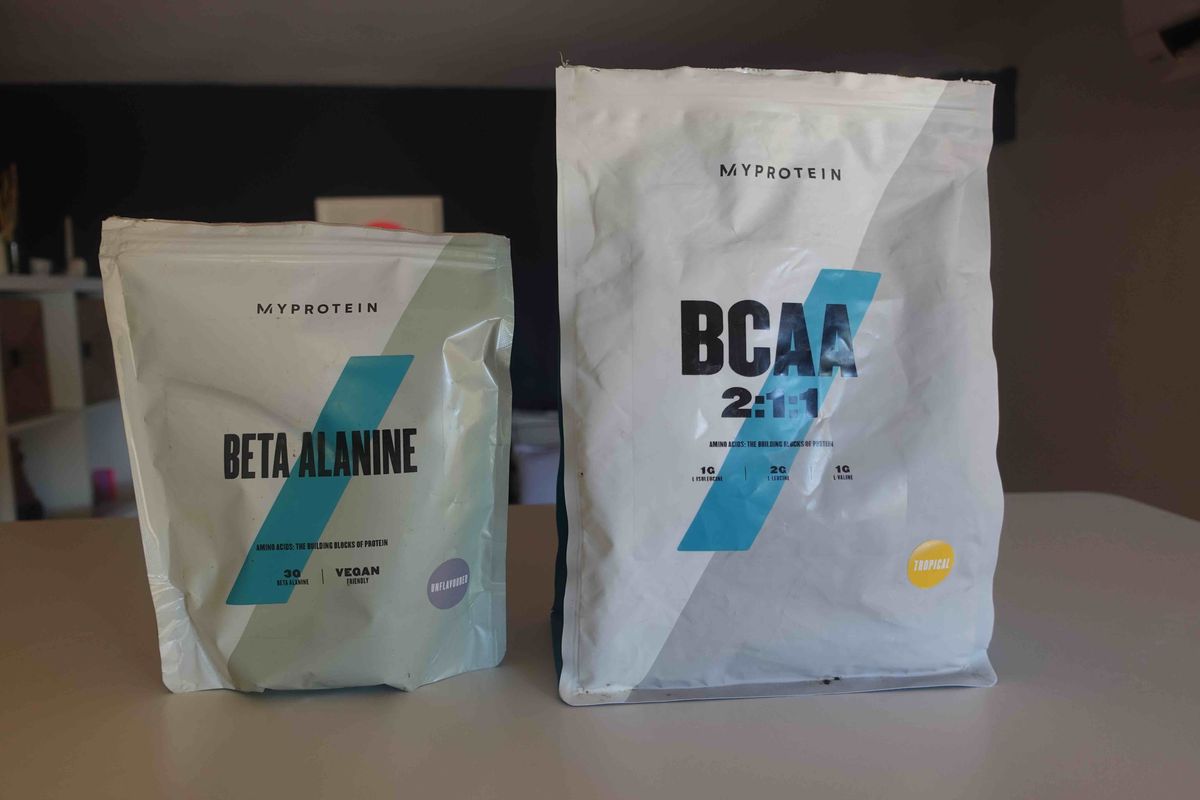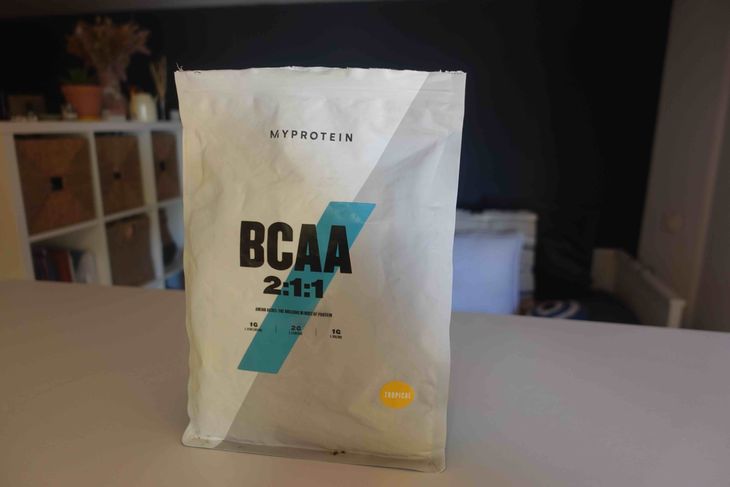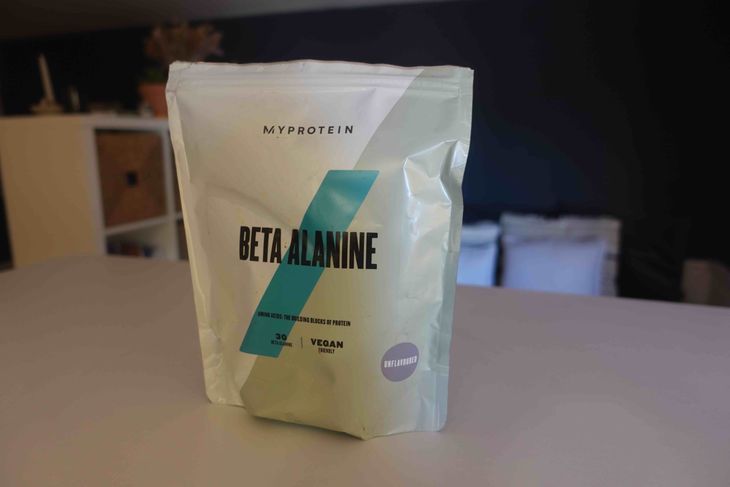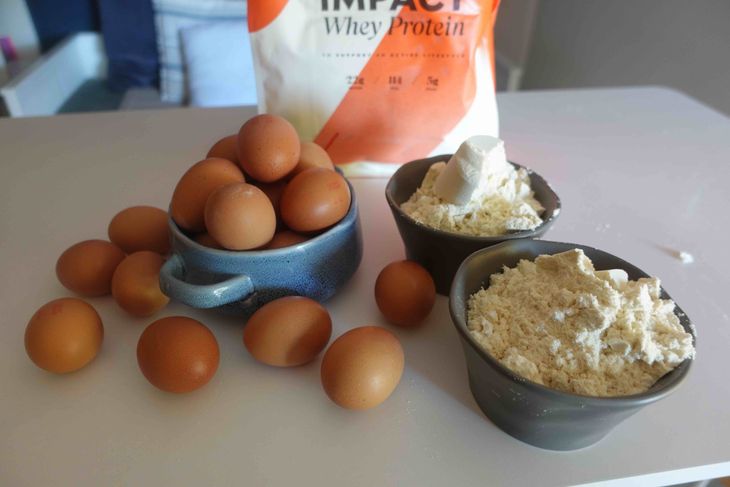BCAA vs Beta-Alanine Supplements: Which Should You Take?

As someone who lifts most days, I've been taking branched-chain amino acids (BCAAs) for years.
Since there's loads of evidence that they improve body composition, strength, endurance, and recovery, you can get them from Myprotein for less than £20, and they make water taste good, it's almost a no-brainer. On the other hand, I've only used beta-alanine during very long runs as it's best known for enhancing endurance. However, I'm planning to do some long runs this year (up to 100 km), so I wanted to learn more about beta-alanine and revisit studies on BCCAs and athletic performance. With a background in biological science (BSc, MSc, PhD), I really value looking at the scientific evidence rather than just accepting the claims made on health and fitness blogs.
For that reason, as well as sharing what I've learned below, you'll find references to the studies I've read at the bottom of this article.
What are BCAAs and Beta-Alanine?
The BCAAs are the amino acids leucine, isoleucine, and valine, essential nutrients found in protein-rich foods that play important roles in the human body, including in relation to muscle tissue repair, reducing exercise-induced muscle breakdown, and improving exercise performance.

Here's my 1-kg bag of BCAAs (tropical flavour). I usually have about 10 grams per day (two small scoops) when lifting or doing endurance training, so the bag will last a few months. I've got the 2:1:1 ratio (leucine, isoleucine, valine) version as it's a little cheaper than the 4:1:1 version. However, I might go for the 4:1:1 version next time, as the evidence suggests that leucine could be the main amino acid behind the athletic benefits associated with BCAAs.
Beta-alanine is a naturally occurring amino acid (specifically, a beta-amino acid*) and popular dietary supplement known for its role in increasing muscle carnosine levels and potentially influencing nitric oxide production, which supports improved performance during high-intensity exercise by reducing lactic acid accumulation and enhancing power output.

Here's my 250-gram bag of beta-alanine.
It looks like Myprotein and Bodybuilding Warehouse only have unflavoured versions of the powder. When I'm done with this bag, I might pick up the beta-alanine capsules on Bodybuilding Warehouse, as the flavour of supposedly unflavoured supplements is usually awful! When I next go for a long run, I'll mix some of this beta-alanine with the flavoured BCAAs. I see that Myprotein has put "Amino Acids: The Building Blocks of Protein" on the bag, which is usually accurate, but beta-alanine isn't one of the amino acids used to make proteins.
This is arguably the main difference between BCAAs and beta-alanine.
Body Composition
Supplementing with BCAAs has been linked to improvements in body composition.
In a randomised, double-blind study (1) evaluating the impact of BCAA supplementation during an eight-week resistance-training programme, participants consuming 14 grams of BCAAs per day experienced greater improvements in body composition than those having 28 grams of carbs in the form of a sports drink. The BCAA group not only gained more lean mass but also showed a greater decrease in body fat. Furthermore, the BCAA-supplemented individuals exhibited superior strength gains in 10-rep max tests for both bench press and squat exercises.

Although a recent systematic review and meta-analysis suggested that beta-alanine does not have a positive effect on body composition (2), a study published in Nutrients found that combining beta-alanine with BCAAs led to a significant increase in fat-free mass among elite athletes (sprinters), suggesting that beta-alanine may enhance the effects of BCAAs on body composition (3i).
So, can both BCAAs and beta-alanine be considered "muscle-building supplements"? It does seem that BCAAs play a role in building muscle, but it's not clear that beta-alanine increases lean muscle mass when taken by itself.
You might also like my article on the benefits of BCAAs for bodybuilders.
Muscle Strength
As mentioned above, as well as improving body composition, BCAAs can increase strength (1), but what about beta-alanine? In one study (4), participants taking beta-alanine (6.4 grams per day), compared to placebo, showed significantly greater gains in strength over a five-week resistance training programme, as demonstrated in exercises like one-rep max back squat. Another study found that combining BCAAs and beta-alanine led to an 18% increase in one-rep max bench press compared to a 10% increase in the control group following an 8-week training programme (5).
Muscle Protein Synthesis
Muscle protein synthesis refers to the incorporation of amino acids into muscle cells and plays a critical role in muscle growth. BCAAs, particularly leucine, activate molecular pathways that increase rates of muscle protein synthesis, especially after resistance exercise. However, the effect of BCAAs on muscle protein synthesis is less pronounced than that observed following ingestion of complete protein sources, like whey protein powder (6). Recent evidence from rodent studies suggests that combining BCAAs with vitamin B (B6) may further enhance muscle protein synthesis (7).
With regards to beta-alanine, there doesn't seem to be evidence that this has a direct effect on muscle protein synthesis.
Muscular Endurance
There's plenty of evidence that BCAAs and beta-alanine can help slow the onset of fatigue and maintain energy levels.
A meta-analysis of 31 trials published in Sport Sciences for Health (8) found that BCAA supplementation reduced lactate and creatine kinase levels, which are markers of muscle fatigue and muscle damage, respectively. Regarding beta-alanine supplementation, 4–6 grams per day can enhance sports performance by attenuating neuromuscular fatigue, especially in older individuals (9).

Additionally, there's evidence that combining beta-alanine and BCAAs before exercise can significantly enhance lower-body muscular endurance and delay fatigue during an intense workout (10).
Thus, supplementing with either BCAAs or beta-alanine (or both) would be an effective way of experiencing less fatigue during exercise.
Muscle Recovery
As touched on in the last section, there's also lots of evidence that BCAAs can minimise damage and recovery time.
For example, in one study (11), it was observed that acute BCAA supplementation at a dosage of 0.087 g/kg body mass (e.g., about 7 grams for an 80-kilo person) significantly enhanced recovery in resistance-trained athletes following exercise-induced muscle damage and reduced perceived muscle soreness at 24 and 48 hours post-exercise compared to placebo.
On the other hand, another study (12) found that beta-alanine supplementation did not improve muscle recovery following a single session of intense training with weights in untrained young adults, as indicated by similar outcomes in muscle function, soreness, and creatine kinase levels between the supplemented group and the placebo group.
Athletic Performance
Both BCAAs and beta-alanine have been linked to enhanced athletic performance.
For instance, one randomised controlled trial (13) found that BCAAs (0.17 g/kg; e.g., 13.6 grams for an 80-kilo person) 1 hour before testing significantly enhanced perceptual-motor performance and reduced central fatigue in male tennis players, resulting in higher accuracy and consistency in hitting balls after a simulated match compared to a placebo. Another study (14) found that beta-alanine supplementation over six weeks (6.4 grams per day) significantly improved athletic performance in young water polo players, as evidenced by enhanced ball-throwing velocity and 200-metre swimming performance.
If you're interested in how supplements influence athletic outcomes, you might like our article on the benefits of creatine for different athletes.
Immune System Function
Both BCCAs and beta-alanine have been linked to additional benefits less directly related to athletic performance benefits, such as improved immune function.
A study published in Medicine & Science in Sports & Exercise (15) found that BCAA supplementation in elite triathletes maintained plasma glutamine levels post-competition, which contrasts with the decrease observed in the placebo group, suggesting an improved immune response by preventing exercise-induced glutamine depletion. This stabilisation of glutamine levels was associated with enhanced lymphocyte proliferation and cytokine production (IL-1), which could reduce the incidence of infection symptoms post-exercise,
Another study (16) found that beta-alanine supplementation (0.5 grams per day) for four weeks helped to maintain immune function after long-distance running by significantly reducing the level of the inflammatory cytokine IL-6 in male college students, compared to a placebo.
Food Sources
As discussed at length in our article comparing egg and whey protein, both eggs and whey contain all essential and non-essential amino acids, so they are a good source of BCAAs. In fact, a single scoop of whey protein isolate or four eggs has at least as much of the essential nutrient leucine (the main ingredient in BCAA supplements) as a 5-gram scoop of a 4:1:1 BCAA powder. While soy protein isolate has a little less leucine than whey, it has similar amounts of isoleucine and valine (17). Other sources include milk, red meat, poultry, and rice (18).

Similarly, beta-alanine is found in meat, poultry, and fish (19). However, unlike BCAAs, which are essential amino acids, beta-alanine is a non-essential amino acid that is synthesised in the liver (20).
Potential Side Effects**
Exacerbation of Neurological Conditions?
BCAAs compete with other large amino acids to be transported into the brain. Since these other amino acids are precursors of important neurotransmitters (e.g., phenylalanine and tryptophan are precursors of dopamine and serotonin, respectively), BCAAs could influence neurotransmitter levels in the brain, which may exacerbate symptoms in conditions like schizophrenia (21) and amyotrophic lateral sclerosis. There is, however, no evidence that BCAA supplementation increases the risk of these conditions.
Increased Insulin Resistance?
Higher BCAA levels in the blood are associated with an increased risk of insulin resistance, obesity, and diabetes (22). While it's possible that consuming more BCAAs increases the risk of such conditions, such as by increasing hunger (23), it's also possible that preexisting differences in how BCAAs are metabolised by those with such conditions lead to their accumulation (24).
Tingling Sensation
In a study published in the International Journal of Nutrology (9), the only noted side-effect of beta-alanine was paraesthesia—itchiness or tingling in the skin that normally subsides within an hour. However, a systematic review of beta-alanine studies found that participants often weren't asked about side effects (25), so it's possible that these just haven't been undocumented.
Artificial Sweeteners
Beta-alanine supplements are often unflavoured, in which case they're unlikely to contain artificial sweeteners. However, artificial sweeteners like sucralose and organic steviol glycosides (aka stevia) are among the most common ingredients in flavoured BCAA supplements. Research suggests that both of these sweeteners are safe (26, 27), though if you're concerned about these or other ingredients hidden in proprietary blends, you could opt for an unflavoured version.
Different Supplements
I've also written about some of the other most common supplements and their evidence base, which might be of interest:
- How pre-workout supplements compare to BCAAs (the pre-workout powder from Myprotein, like many other pre-workouts, contains beta-alanine)
- How whey protein powders compare to BCAAs (If you're interested in other protein supplements, we also have articles focused on the best supplements for weight loss, weight gain, diabetics, and seniors)
- How creatine monohydrate compares to BCAAs
- How glutamine compares to BCAAs
- How EAAs compare to BCAAs
- How BCAA pills compare to BCAA powders
- How essential amino acid supplements compare to protein supplements
- The best time to take BCAAS
- How beta-alanine compares to creatine
Conclusion
So, there's a decent amount of evidence that BCAAs and beta-alanine can play important roles in enhancing athletic performance, reducing fatigue, and supporting muscle recovery. BCAAs have been linked to muscle repair and reducing exercise-induced muscle breakdown, while beta-alanine increases muscle carnosine levels, helping to reduce lactic acid build-up during intense exercise. The combination of these supplements appears to offer synergistic effects, making them a powerful tool for achieving fitness goals like improving body composition and muscle strength.
About the Author
Dave Robinson is a co-founder of ukfitness.pro and has a background in psychology (BSc) and neuroscience (MSc, PhD). As well as strength training, he enjoys endurance challenges and has completed marathons and ultramarathons, cycled across several countries, and completed the Three Peaks Challenge. When writing, he draws on scientific evidence to understand the pros and cons of different diets, supplements, and training regimes.
As an Amazon Associate, the site earns from qualifying purchases.
Foot Notes
*Essentially, beta-amino acids differ from alpha-amino acids in terms of their structure. The details of these differences are beyond the scope of this article, but there's a brief overview here.
**Whether or not you have a medical condition, it's always best to talk to your doctor before starting a new supplement regime.
References
1. Stoppani, J., Scheett, T., Pena, J., Rudolph, C., & Charlebois, D. (2009). 2009 international society of sports nutrition conference and expo new orleans, la, USA. 14-15 June 2009. Abstracts. Journal of the International Society of Sports Nutrition, 6 Suppl 1(Suppl 1), P1–P19. https://doi.org/10.1186/1550-2783-6-s1-p1
2. Ashtary-Larky, D., Bagheri, R., Ghanavati, M., Asbaghi, O., Wong, A., Stout, J. R., & Suzuki, K. (2022). Effects of beta-alanine supplementation on body composition: a GRADE-assessed systematic review and meta-analysis. Journal of the International Society of Sports Nutrition, 19(1), 196–218. https://doi.org/10.1080/15502783.2022.2079384
3. Durkalec-Michalski, K., Kusy, K., Ciekot-Sołtysiak, M., & Zieliński, J. (2019). The Effect of Beta-Alanine versus Alkaline Agent Supplementation Combined with Branched-Chain Amino Acids and Creatine Malate in Highly-Trained Sprinters and Endurance Athletes: A Randomized Double-Blind Crossover Study. Nutrients, 11(9), 1961. https://doi.org/10.3390/nu11091961
4. Maté-Muñoz, J. L., Lougedo, J. H., Garnacho-Castaño, M. V., Veiga-Herreros, P., Lozano-Estevan, M. D. C., García-Fernández, P., de Jesús, F., Guodemar-Pérez, J., San Juan, A. F., & Domínguez, R. (2018). Effects of β-alanine supplementation during a 5-week strength training program: a randomized, controlled study. Journal of the International Society of Sports Nutrition, 15, 19. https://doi.org/10.1186/s12970-018-0224-0
5. Lowery, R. P., Joy, J. M., Dudeck, J. E., Oliveira de Souza, E., McCleary, S. A., Wells, S., Wildman, R., & Wilson, J. M. (2013). Effects of 8 weeks of Xpand® 2X pre workout supplementation on skeletal muscle hypertrophy, lean body mass, and strength in resistance trained males. Journal of the International Society of Sports Nutrition, 10(1), 44. https://doi.org/10.1186/1550-2783-10-44
6. Kaspy, M. S., Hannaian, S. J., Bell, Z. W., & Churchward-Venne, T. A. (2023). The effects of branched-chain amino acids on muscle protein synthesis, muscle protein breakdown and associated molecular signalling responses in humans: an update. Nutrition research reviews, 1–14. Advance online publication. https://doi.org/10.1017/S0954422423000197
7. Wang, Y., Zhao, X., Ma, Y., Yang, Y., & Ge, S. (2023). The effects of vitamin B6 on the nutritional support of BCAAs-enriched amino acids formula in rats with partial gastrectomy. Clinical nutrition (Edinburgh, Scotland), 42(6), 954–961. https://doi.org/10.1016/j.clnu.2023.04.018
8. Hormoznejad, R., Zare Javid, A. & Mansoori, A. Effect of BCAA supplementation on central fatigue, energy metabolism substrate and muscle damage to the exercise: a systematic review with meta-analysis. Sport Sci Health 15, 265–279 (2019). https://doi.org/10.1007/s11332-019-00542-4
9. Woitas, L. R., & Ribas, J. W. (2022). Major clinical findings of β-alanine in sports performance: a systematic review. International Journal of Nutrology, 15(2). https://doi.org/10.54448/ijn22205
10. Spradley, B.D., Crowley, K.R., Tai, CY. et al. Ingesting a pre-workout supplement containing caffeine, B-vitamins, amino acids, creatine, and beta-alanine before exercise delays fatigue while improving reaction time and muscular endurance. Nutr Metab (Lond) 9, 28 (2012). https://doi.org/10.1186/1743-7075-9-28
11. Waldron, M., Whelan, K., Jeffries, O., Burt, D., Howe, L., & Patterson, S. D. (2017). The effects of acute branched-chain amino acid supplementation on recovery from a single bout of hypertrophy exercise in resistance-trained athletes. Applied physiology, nutrition, and metabolism, 42(6), 630–636. https://doi.org/10.1139/apnm-2016-0569
12. Roveratti, M. C., Jacinto, J. L., Oliveira, D. B., da Silva, R. A., Andraus, R. A. C., de Oliveira, E. P., Ribeiro, A. S., & Aguiar, A. F. (2019). Effects of beta-alanine supplementation on muscle function during recovery from resistance exercise in young adults. Amino acids, 51(4), 589–597. https://doi.org/10.1007/s00726-018-02686-y
13. Yang, C. C., Wu, C. L., Chen, I. F., & Chang, C. K. (2017). Prevention of perceptual-motor decline by branched-chain amino acids, arginine, citrulline after tennis match. Scandinavian journal of medicine & science in sports, 27(9), 935–944. https://doi.org/10.1111/sms.12717
14. Claus, G. M., Redkva, P. E., Brisola, G. M. P., Malta, E. S., de Araujo Bonetti de Poli, R., Miyagi, W. E., & Zagatto, A. M. (2017). Beta-Alanine Supplementation Improves Throwing Velocities in Repeated Sprint Ability and 200-m Swimming Performance in Young Water Polo Players. Pediatric exercise science, 29(2), 203–212. https://doi.org/10.1123/pes.2016-0176
15. Bassit, R. A., Sawada, L. A., Bacurau, R. F., Navarro, F., & Costa Rosa, L. F. (2000). The effect of BCAA supplementation upon the immune response of triathletes. Medicine and science in sports and exercise, 32(7), 1214–1219. https://doi.org/10.1097/00005768-200007000-00005
16. Jin, S.-Y., Moon, H.-W., Kim, J.-S., & Kim, H.-Y. (2022). Effects of 4 weeks of beta-alanine intake on inflammatory cytokines after 10 km long distance running exercise. Exerc Sci, 31(2), 188-196. https://doi.org/10.15857/ksep.2022.00136
17. Rasmussen, C.J. (2008). Nutritional Supplements for Endurance Athletes. In: Nutritional Supplements in Sports and Exercise. Humana Press. https://doi.org/10.1007/978-1-59745-231-1_11
18. Vieira, E. E. S., Pereira, I. C., Braz, A. F., Nascimento-Ferreira, M. V., de Oliveira Torres, L. R., de Freitas Brito, A., do Nascimento Marreiro, D., de Castro E Sousa, J. M., da Silva, F. C. C., & Torres-Leal, F. L. (2020). Food consumption of branched chain amino acids and insulin resistance: A systematic review of observational studies in humans. Clinical nutrition ESPEN, 40, 277–281. https://doi.org/10.1016/j.clnesp.2020.09.007
19. Trexler, E. T., Smith-Ryan, A. E., Stout, J. R., Hoffman, J. R., Wilborn, C. D., Sale, C., Kreider, R. B., Jäger, R., Earnest, C. P., Bannock, L., Campbell, B., Kalman, D., Ziegenfuss, T. N., & Antonio, J. (2015). International society of sports nutrition position stand: Beta-Alanine. Journal of the International Society of Sports Nutrition, 12, 30. https://doi.org/10.1186/s12970-015-0090-y
20. Cesak, O., Vostalova, J., Vidlar, A., Bastlova, P., & Student, V., Jr (2023). Carnosine and Beta-Alanine Supplementation in Human Medicine: Narrative Review and Critical Assessment. Nutrients, 15(7), 1770. https://doi.org/10.3390/nu15071770
21. Holeček M. (2022). Side effects of amino acid supplements. Physiological research, 71(1), 29–45. https://doi.org/10.33549/physiolres.934790
22. Cuomo, P., Capparelli, R., Iannelli, A., & Iannelli, D. (2022). Role of Branched-Chain Amino Acid Metabolism in Type 2 Diabetes, Obesity, Cardiovascular Disease and Non-Alcoholic Fatty Liver Disease. International journal of molecular sciences, 23(8), 4325. https://doi.org/10.3390/ijms23084325
23. Yoon M. S. (2016). The Emerging Role of Branched-Chain Amino Acids in Insulin Resistance and Metabolism. Nutrients, 8(7), 405. https://doi.org/10.3390/nu8070405
24. Solon-Biet, S. M., Cogger, V. C., Pulpitel, T., Wahl, D., Clark, X., Bagley, E., Gregoriou, G. C., Senior, A. M., Wang, Q. P., Brandon, A. E., Perks, R., O'Sullivan, J., Koay, Y. C., Bell-Anderson, K., Kebede, M., Yau, B., Atkinson, C., Svineng, G., Dodgson, T., Wali, J. A., … Simpson, S. J. (2019). Branched chain amino acids impact health and lifespan indirectly via amino acid balance and appetite control. Nature metabolism, 1(5), 532–545. https://doi.org/10.1038/s42255-019-0059-2
25. Quesnele, J. J., Laframboise, M. A., Wong, J. J., Kim, P., & Wells, G. D. (2014). The effects of beta-alanine supplementation on performance: a systematic review of the literature. International journal of sport nutrition and exercise metabolism, 24(1), 14–27. https://doi.org/10.1123/ijsnem.2013-0007
26. Grotz, V. L., & Munro, I. C. (2009). An overview of the safety of sucralose. Regulatory toxicology and pharmacology : RTP, 55(1), 1–5. https://doi.org/10.1016/j.yrtph.2009.05.011
27. Geuns, J. M. C. (2002). Safety evaluation of Stevia and stevioside. Studies in Natural Products Chemistry, 27(Part H), 299-319. https://doi.org/10.1016/S1572-5995(02)80039-4